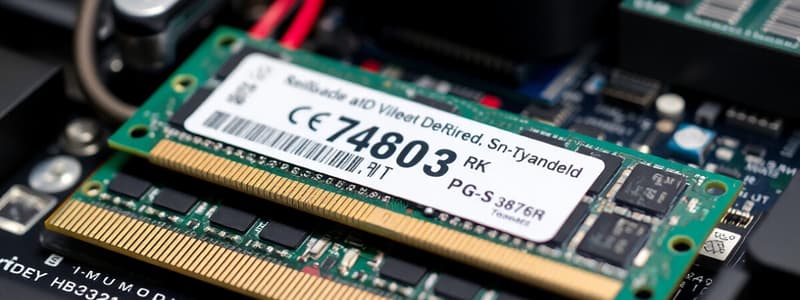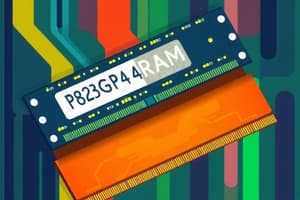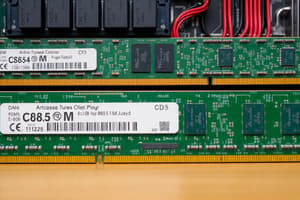Podcast
Questions and Answers
What is the primary function of Read-Only Memory (ROM) in a computer?
What is the primary function of Read-Only Memory (ROM) in a computer?
- To serve as temporary storage for data in use.
- To execute programs and applications during operation.
- To store frequently accessed data for quick retrieval.
- To provide instructions needed to start the computer. (correct)
Which type of ROM can be programmed only once after manufacture?
Which type of ROM can be programmed only once after manufacture?
- PROM (correct)
- Flash memory
- BIOS
- EPROM
What primarily differentiates secondary storage from primary storage in terms of data retention?
What primarily differentiates secondary storage from primary storage in terms of data retention?
- Secondary storage remains intact without power, while primary storage does not.
- Secondary storage is faster but less expensive than primary storage.
- Primary storage is volatile, while secondary storage is non-volatile. (correct)
- Primary storage has a greater storage capacity than secondary storage.
What is a significant advantage of using secondary storage over primary storage?
What is a significant advantage of using secondary storage over primary storage?
Which of the following storage devices is NOT typically classified as secondary storage?
Which of the following storage devices is NOT typically classified as secondary storage?
What is another name for primary storage?
What is another name for primary storage?
Which component of the CPU is responsible for performing arithmetic and logic functions?
Which component of the CPU is responsible for performing arithmetic and logic functions?
Why is RAM referred to as working memory?
Why is RAM referred to as working memory?
What happens to data held in RAM when the computer is turned off?
What happens to data held in RAM when the computer is turned off?
What must occur before programs and data from secondary storage can be processed?
What must occur before programs and data from secondary storage can be processed?
Which of the following is NOT a type of memory chip found in primary storage?
Which of the following is NOT a type of memory chip found in primary storage?
What role does the Control Unit (CU) play within the CPU?
What role does the Control Unit (CU) play within the CPU?
Which statement about RAM is true?
Which statement about RAM is true?
Flashcards are hidden until you start studying
Study Notes
Primary Storage
- Primary storage is directly accessible to the CPU for processing data and instructions.
- It's also known as main memory or immediate access store (IMAS).
- It consists of memory chips on the computer's motherboard.
- Two types of memory chips are used:
- Random Access Memory (RAM): Holds temporary data and instructions during processing.
- Called working memory as it's volatile and loses data when power is switched off.
- Requires loading programs and data from secondary storage before processing.
- Capacity ranges from 4GB to 32GB in 2019.
- Relatively expensive and a key factor in computer pricing.
- Read-Only Memory (ROM): Stores essential instructions for starting the computer.
- Contains system-level programs like BIOS.
- Holds translators for high-level languages and operating systems.
- Data and instructions are fixed during manufacture.
- Non-volatile, meaning data persists even when power is off.
- Variations include:
- Programmable ROM (PROM): Can be programmed once using special equipment.
- Erasable Programmable ROM (EPROM): Can be deleted and reprogrammed.
- Random Access Memory (RAM): Holds temporary data and instructions during processing.
Secondary Storage
- Also called auxiliary or backup storage.
- Stores data and instructions when not being processed.
- More permanent than main memory, data is retained even when power is off.
- Significantly cheaper than primary storage and has unlimited capacity.
- Common devices include:
- Magnetic disks
- Optical disks
- Flash memory
- USB drives
- Magnetic tapes (less common).
Studying That Suits You
Use AI to generate personalized quizzes and flashcards to suit your learning preferences.




